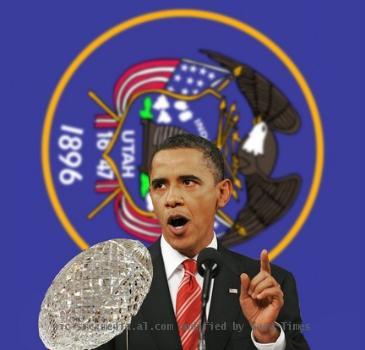Palestinian leader gives rare interview to Israeli reporters, seeks support for peacemaking
By Amy Teibel, APThursday, July 1, 2010
Palestinian leader gives interview to Israel media
JERUSALEM — The Palestinian president made a fresh bid to win over public opinion in Israel by giving a rare interview to Israeli journalists in which he cast himself as a serious partner for peace talks.
The interview, reported in major Israeli newspapers on Thursday, came as Washington’s special Mideast envoy, George Mitchell, was visiting the region trying to find enough common ground between the two sides to allow direct talks to resume.
Also Thursday, Israel’s prime minister, Benjamin Netanyahu, announced he has accepted a German mediator’s proposal to release 1,000 Palestinian prisoners in exchange for a captive Israeli soldier held by Hamas militants in Gaza for four years. But he said the most dangerous prisoners would not be allowed to return to their homes and “mass murderers” would not be freed.
The newspaper interviews with President Mahmoud Abbas published Thursday marked his first direct attempt to explain his government’s positions to Israelis and counter claims by Israeli hard-liners that they have no partner for peace talks. In a related move, Abbas tried to rally support last month at a meeting with more than 30 Jewish-American leaders and other political heavyweights during a trip to Washington.
“Don’t let me lose hope,” the 75-year-old Palestinian leader told the Haaretz newspaper.
Mitchell has been shuttling between the Israelis and Palestinians for two months with the aim of relaunching direct negotiations in the fall. But Abbas said earlier this week that he has not received enough encouraging signs from Israel to warrant that.
During the three-hour interview Wednesday in his office in the West Bank city of Ramallah, Abbas told Israeli journalists that borders of a future Palestinian state and security relations with Israel are the two issues on the table, and that if an agreement on them is reached, direct talks can resume.
Abbas also said he proposed to Israeli Prime Minister Benjamin Netanyahu that an international force under NATO or U.N. auspices reinforce Palestinian security forces in a future Palestinian state.
“I’m still waiting to receive an answer or some sort of sign from him,” Maariv quoted Abbas as saying.
The Haaretz and Maariv dailies gave the interview front-page coverage while Yediot Ahronot, the nation’s largest newspaper, tucked it into page 14.
“President Abbas is trying to reach out to the Israeli public,” said his top aide and chief negotiator, Saeb Erekat. “He wanted to say that we want an Israeli partner for the end game, a partner that chose peace, not settlement, peace, not occupation.”
Netanyahu has endorsed the idea of a Palestinian state but has given no details on how much of the Israeli-controlled West Bank he would be willing to cede. He also opposes any withdrawal from east Jerusalem, the section of the city where Palestinians want their capital.
Speaking late Thursday at an Independence Day party at the U.S. Embassy in Tel Aviv, Netanyahu appeared to respond to Abbas’ move by repeating his call for direct peace talks.
“I would say to President Abbas that the best way to convince Israelis that you are serious about peace is to begin serious, direct peace negotiations,” he said.
That speech came hours after Netanyahu appeared on national television to spell out his conditions for a prisoner swap with Gaza’s Hamas rulers for the captured soldier. His parents are in the midst of a 12-day nationwide march to draw attention to the plight of their son.
Netanyahu said he understands the family’s pain, but said there are certain red lines he cannot cross.
“Dangerous terrorists will not return to the West Bank, from where they can continue to attack Israelis,” he said, charging that Palestinians released in past prisoner swaps have returned to violence.
He said these prisoners instead could go the Gaza Strip, from which few Palestinians can travel, or be deported from the region.
He also said “mass murderers” would not be released, “because these people, when they leave jail, will strengthen Hamas and inspire new waves of terror.” In Gaza, spokesman Ayman Taha said Hamas would reject a deal that excluded certain prisoners or had them sent abroad.
Tags: Barack Obama, Gaza Strip, International Agreements, Israel, Jerusalem, Middle East, Palestinian Territories, Prisoner Exchange, Territorial Disputes, West Bank, World cup

